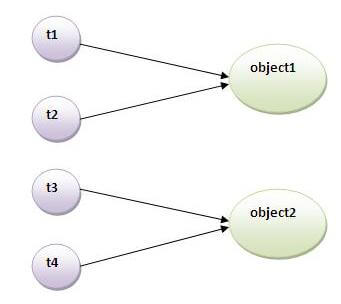Today my mood is to play with thread...let's start:
If you make any static method as synchronized, the lock will be on the class not on object.

Problem without static synchronization
Suppose there are two objects of a shared class(e.g. Table) named object1 and object2.In case of synchronized method and synchronized block there cannot be interference between t1 and t2 or t3 and t4 because t1 and t2 both refers to a common object that have a single lock.But there can be interference between t1 and t3 or t2 and t4 because t1 acquires another lock and t3 acquires another lock.I want no interference between t1 and t3 or t2 and t4.Static synchronization solves this problem.
Example of static synchronization
In this example we are applying synchronized keyword on the static method to perform static synchronization.
- class Table{
- synchronized static void printTable(int n){
- for(int i=1;i<=10;i++){
- System.out.println(n*i);
- try{
- Thread.sleep(400);
- }catch(Exception e){}
- }
- }
- }
- class MyThread1 extends Thread{
- public void run(){
- Table.printTable(1);
- }
- }
- class MyThread2 extends Thread{
- public void run(){
- Table.printTable(10);
- }
- }
- class MyThread3 extends Thread{
- public void run(){
- Table.printTable(100);
- }
- }
- class MyThread4 extends Thread{
- public void run(){
- Table.printTable(1000);
- }
- }
- class Use{
- public static void main(String t[]){
- MyThread1 t1=new MyThread1();
- MyThread2 t2=new MyThread2();
- MyThread3 t3=new MyThread3();
- MyThread4 t4=new MyThread4();
- t1.start();
- t2.start();
- t3.start();
- t4.start();
- }
- }
Output:1
2
3
4
5
6
7
8
9
10
10
20
30
40
50
60
70
80
90
100
100
200
300
400
500
600
700
800
900
1000
1000
2000
3000
4000
5000
6000
7000
8000
9000
10000
No comments:
Post a Comment